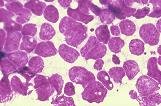Advertisment
Afatinib slows relapse in NSCLC

An investigational oral drug delayed disease relapse for nearly a year in some patients with advanced non-small cell lung cancer (NSCLC).
In lung adenocarcinomas that harbour mutations in a key receptor, the tyrosine kinase inhibitor (TKI) afatinib outperformed standard chemotherapy with cisplatin and pemetrexed (Alimta), according to James Yang, MD, of the National Taiwan University in Taipei. Patients receiving the study drug also had improved quality of life and less cough and shortness of breath, Yang told reporters at the annual meeting of the American Society of Clinical Oncology (ASCO).
The findings come from a large phase III trial involving 354 patients with stage IIIB or IV NSCLC that had mutations in the gene for the epidermal growth factor receptor (EGFR), Yang said. Currently, two TKIs are approved to target EGFR mutations: gefitinib (Iressa) and erlotinib (Tarceva).
But Yang said afatinib differs from those to TKIs in that it is irreversible. “When it binds to EGFR, it doesn’t bail out,” he said. He added that the drug also targets other receptors in the same family as EGFR, which might give it broader anti-cancer activity. The trial’s primary endpoint was difference in progression-free survival (PFS), Yang said, and after a median follow-up of 8 months, the median time to relapse was 11.1 months among patients getting the drug.
In contrast, the median PFS for those receiving chemotherapy was 6.9 months, yielding a hazard ratio for relapse of 0.58, which was significant at P=0.004.
Among patients with the two most common EGFR mutations — deletion 19 or L858R — the benefit was even greater: 13.6 months before relapse versus 6.9.
Adverse events were similar to those seen with other EGFR inhibitors, Yang said, and 7.9% of afatinib patients dropped out because of toxicity, compared with 11.7% of those in the chemotherapy arm. He added that patients reported better quality of life in the afatinib arm, mainly because of better control of such symptoms as cough and shortness of breath. The study is “exciting” for two reasons, commented Sylvia Adams, MD, of New York University Langone Medical Center, who was not part of the study but who moderated the ASCO press conference.
Afatinib represents a new generation of tyrosine kinase inhibitors” and blocks the entire family receptor that includes EGFR.
The drug will probably be approved as first-line therapy for disease with EGFR-mutated NSCLC, she said, but the broader activity might lead to wider use.
The results are also exciting because there was a clear clinical benefit for patients in terms of better PFS and quality of life, she said.
Disclosure:
The study was supported by Boehringer Ingelheim. Yang reported financial links with the company. Other authors are employees of the firm.
Reference:
Yang J, et al “LUX-lung 3: a randomized, open-label, phase III study of afatinib versus pemetrexed and cisplatin as first-line treatment for patients with advanced adenocarcinoma of the lung harboring EGFR-activating mutations”ASCO 2012; Abstract LBA7500.





